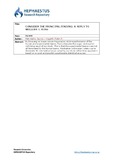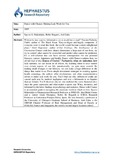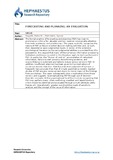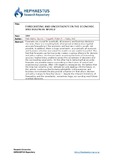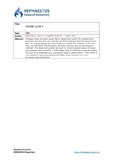Browsing by Author "Hogarth, Robin M."
Now showing items 1-6 of 6
-
Consider the principal finding: A reply to William T. Ross
Makridakis, Spyros; Hogarth, Robin M. (INFORMS, Institute for Operations Research and the Management Sciences, 1988-05)By focusang on issues concerning precise reUuive perfonnance of the human and experimental teams, Ross crtsscutes the nugor, and a priori »ir[»ising result of our study. This is that the experimental teams were not all ...
-
Dance with Chance: Making Luck Work for You
Makridakis, Spyros; Hogarth, Robin M.; Gaba, Anil (Oneworld Publications, 2009)Written by true experts. Informative yet so much fun to read!" Nassim Nicholas Taleb- author of The Black Swan "Easy-to-digest and highly competent. If everyone were to read this book, the world would become a more enlightened ...
-
Forecasting and planning: an evaluation
Hogarth, Robin M.; Makridakis, Spyros (Management Science, 1981-02)The formal practice of forecasting and planning (F&P) has risen to prominence within a few decades and now receives considerable attention from both academics and practitioners. This paper explicitly recognizes the nature ...
-
Forecasting and uncertainty in the economic and business world
Makridakis, Spyros; Hogarth, Robin M.; Gaba, Anil (Elsevier, 2009)Forecasts are crucial for practically all economic and business decisions. However, there is a mounting body of empirical evidence showing that accurate forecasting in the economic and business world is usually not possible. ...
-
Think lucky
Makridakis, Spyros; Hogarth, Robin M.; Gaba, Anil (2009)Strategy theories make great claims about their ability to contribute to business success, but how realistic are those claims? We only have to look back to re engineering and its promised miracles, for a lesson in how far ...
-
The Value of Decision Making in a Complex Environment: An Experimental Approach
Hogarth, Robin M.; Makridakis, Spyros (The European Institute of Business Administration, Fontainebleau, France, 1981)Are the costs of time arid effort spent on analyzing decisions outweighed by benefits? This issue was examined in the context of a competitive business game where human teams were pitted against two kinds of simple-minded ...

